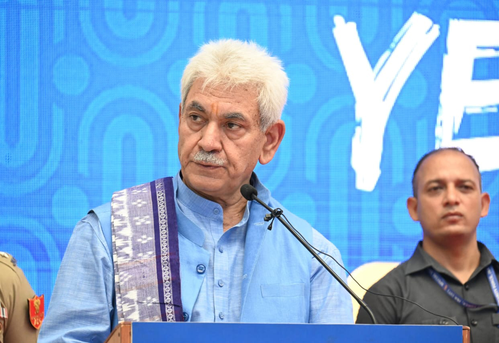Jammu: The Lieutenant Governor of Jammu and Kashmir, Manoj Sinha, on Monday lauded the Interim Budget 2024 for the Union Territory, and expressed gratitude to Prime Minister Narendra Modi and Finance Minister Nirmala Sitharaman.
Finance Minister Nirmala Sithraman on Monday presented the Interim Budget 2024 for J&K, besides revising the estimates for the UT for the current fiscal.
The L-G tweeted: “Grateful to Hon’ble PM Shri Narendra Modi Ji & Hon’ble FM Smt Nirmala Sitharaman Ji for J&K’s Interim Budget 2024-25, which is dedicated to farmers, women, youth, marginalised sections of society and seeks to strengthen the grass-roots democracy in the Union Territory.
“The Interim Budget highlights the government’s commitment of rapid economic growth and ensures that the growth is socially inclusive and sustainable. It focuses on fast expansion of agricultural economy and addresses the issue of regional imbalances besides seeking to bridge the rural-urban divide.
A statement issued by the Finance Department of the UT said: “The Central government has agreed to provide Rs 41,751.44 crore to the UT government in this financial year and Rs 37,277.74 crore in the next financial year.
It said that these assistance figures have been duly captured in the Revised Estimates of 2023-24 and the Budget Estimates of 2024-25 of the Central government.
“This assistance will be provided under the MHA’s demand No. 58 for assistance to the UT. This assistance includes the normal assistance (resource gap) to the UT government, and equity contribution for hydropower projects at Kiru, Kwar and Rattle,” the statement said.
The L-G said, “The budget creates an enabling environment for investment and seeks to accelerate industrial growth. It will ensure that industries generate more employment, provide support to the thrust areas identified for investment and encourage the startup ecosystem in the UT.
“The budget focuses on skill development and employment of Nari Shakti. It seeks to ensure that benefits of rapid economic growth flow equitably to the women in rural and urban areas, SHGs are empowered, and women-owned business enterprises are provided access to resources and networks.”
–IANS


Comments are closed.